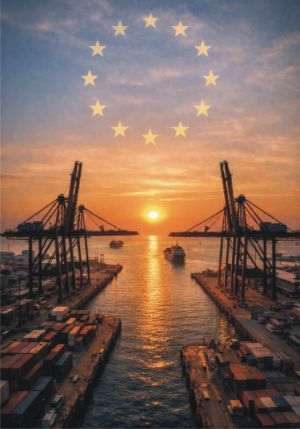• Interview with economist Lucian Isar
Reporter: We are in a very stormy period, both on the monetary market as well as on the currency market, which began at the end of last year, when the ROBOR-tied tax on bank assets was approved, and that period has gotten more difficult after the explosion of the exchange rate. What is your view on the situation we are going through?
Lucian Isar: The madness began in September 2017, when senator Daniel Zamfir called NBR governor Mugur Isărescu to appear in the Economic Commission. Back then, the ROBOR was 0.69%. After receiving the invitation, Isărescu started calling every politician he knew or he had ever worked well with in the past, trying to block the request of Zamfir. The latter stood by his request, accepted the first excuse - that Mugur Isărescu was sick -, he reiterated the request, Isărescu used every trick in the book to avoid appearing in front of the Commission and that is when the ROBOR began rising.
Whereas up until then there used to be a time where the ROBOR sat at an unnaturally low level - the economy was growing faster than its potential, and the ROBOR was way below the reference rate of 1.75% -, from that moment on that index started rising exponentially, meaning it increased 5 fold in seven months.
Reporter: But analysts were estimating already that the ROBOR would rise, as that was the trend on the European market as well ...
Lucian Isar: Analysts had been predicting since 2014 that the ROBOR would rise. That is the nuance - when you keep the ROBOR far below the policy rate, when all the analysts are saying that the economy would rise way above the potential and the interest rate needed to be raised, then it is mandatory to take under consideration pertinent explanations but which are considered as alternative ones. The only alternative explanation why between 2014 and 2017 that index has been kept low, even though there was every signal that it needed to be hiked was the pact between Victor Ponta and Mugur Isărescu, made in 2014, for the latter to be reappointed as NBR governor upon retirement. The appointment of 2014 was not done on time, rather, before, exactly on the day that Isărescu entered retirement. One of the presents made to the various governors with who he was on good terms was to keep the ROBOR at an unnaturally low level, even though that has resulted in macroeconomic imbalances. An imbalanced economy is easy to plunge into crisis, when ordered.
The situation in 2018 is a clone of that of 2008. Meaning that the monetary and lending policy up until 2008, and the one prior to 2018 have created imbalances in the country's economy. If the monetary policy and credit policy hadn't been pro-cyclical, to the degree of exacerbating recession - respectively to stimulate the economy on the expansion stage and beyond -, then we wouldn't have had these imbalances, such as the current account imbalance we have now. In September 2017, amid the anger over being the NBR governor being called to appear before the senate commission, the ROBOR started rising explosively. Isărescu's worry was that he would get suspended, like Mişu Negriţoiu was suspended from the Financial Oversight Authority (ASF) following such a request, which initially seemed of little consequence. That is the fear which has prevented the head of the NBR to show up before the joint commission of the Senate.
Reporter: Specifically, what do you think this plan consists of?
Lucian Isar: The idea was that if his ROBOR pressure scheme didn't work out, he would use the lethal weapon - causing the exchange rate to rise. His scheme to raise the ROBOR didn't work out because the ROBOR-pegged bank asset tax came out. This hybrid, cleverly designed tax introduced a factor which messed up Isărescu's calculations.
Reporter: It would appear that we are currently in the midst of a war between the PSD and the NBR on one hand, and between the Government and the whole of the NBR, on the other ...How would you describe the statements of these three institutions made lately?
Lucian Isar: The manipulation and the propaganda of governor Isărescu are redoubtable and have been practiced over the course of 30 years, throughout many governments and presidents of Romania. This is the main reason why he is now positioning himself as a credible opponent of the governing coalition or of the Govenrrnment, when in reality Isărescu was appointed and kept in the job regardless of any incidents or mistakes by the Iliescu-Văcăroiu faction. The NBR governor constantly had his own people in the Finance Ministry, which he had control of over, he accepted for them to be in charge of state-owned commercial banks and would offer them positions as NBR advisors after leaving the Ministry of Public Finances.
That is the constant promise of the Governor, both for those in the Finance Ministry, as well as from those in the intelligence services and the prosecutor's offices. Currently, a number of people he controlled in the Finance Ministry have left and therefore, there is no longer the cooperation and the underground discussions between Isărescu and some of the employees in the Finance Ministry. In general, he tried to fool the people at the Treasury that he was the only one that could secure funding for Romania.
The scheme used for financing Romania's debt to its detriment, but to the benefit of Isărescu's own performance bonus has been successfully applied between 2009-2011 and is known among the Treasurers as "the shuttle". Isărescu taleked to the PM in office at the time - Boc - and then he offered him the possibility to finance the state's deficit through the banks. In other words, the NBR would give the banks money through REPO, and the banks would finance the state. The agreement was strictly monitored not just in the meetings at the headquarters of the NBR and the Training Center of the NBR in the Sycamore Park, but especially through the reports sent to the Oversight Department led by Mr. Nicolae Cinteză. Banks would get 0.75% on every transaction and the deficit would be financed at the policy rate of the NBR plus the aforementioned premium. As a result, the financing average interest rate was 10% in 2009. This was insane for a country going through recession and that had its own currency! Compare to Poland, Czech Republic, Hungary to see how much money has been diverted from the Romanian state towards the bonuses of Mr. Isărescu and the selected bankers. This - the very high interest rates - is one of the reasons why Romania stayed in a recession more than it should have - 2009 and 2010 - and why we have had such a deficit. The money which Isărescu was financing was found in his performance bonus, in the bonuses of the commercial banks and of course, were paid by the Romanian citizens, through taxes.
Mr. Isărescu negotiates the extension of his term at least a year in advance. His fear is that if he leaves the NBR without a parachute, then the future audit will serve him up on a platter to the prosecutors and lead to extended asset seizure. There are far too many concealed issues at the NBR, which the future management will not be able to deliver to the auditors because it would mean that some time after acknowledging them, they'd be on the hook. Isărescu tried to stall for time, as one last case was closed in March 2018. This has confirmed the financial flow from the whistleblower to "Mugurel" Isărescu and Lăcrămioara Isărescu, but the prosecutor could not find the connection between the papers signed by Isărescu and the amount paid. Strangely, the prosecutor disregarded the activity of the NBR all throughout by "Mugurel" Isărescu and the influence of the four major projects of Sorin Ovidiu Vântu: the association CEC Bank - FNI, Banca Română de Scont, Banca de Dezvoltare şi Investiţii and Romexterra Bank.
In the summer of 2018, a spokesperson from the BNR said that the negotiations for the leadership positions of the NBR are not public, but underground, as the people from the NBR had been pleased to postpone by seven months the approval of the Zamfir laws. There are still underground negotiations to keep Mugur Isărescu as head of the NBR.
The scheme with the attack on the currency has been used at least two other times when Isărescu was in a tight spot. In 1997, president Emil Constantinescu wanted to replace Isărescu for exactly the same reasons that he replaced Măgureanu (ed. note: Virgil Măgureanu, former head of the SRI). All of a sudden, the dollar/leu exchange rate jumped to 7000, then to 14,000, to then go down to 9,000, two days later. When it reached that level, an American commercial bank was personally asked by Mr. Isărescu to sell its share capital. It only sold 22 million dollars, in other words an insignificant amount, but that was enough to bring the exchange rate from 14,000 to 9,000. The initial rise, from 7,000 to 14,000, was simply a manipulation.
In 2008, one year before the elections for the Board of Directors of the NBR, we had the charade in the press with the "attack on the leu", whereby Isărescu would come out like a savior, to convince Băsescu (ed. note: former president Traian Băsescu) to extend his term and protect the margin accounts.
In the context of the elections for the Board of Directors of the NBR of April 2019, things are as follows, right now: the explosion of the exchange rate has nothing to do with the Emergency Government Ordinance 114, because it has been issued in December, and the Euro didn't do anything. Two days prior to the explosion of the exchange rate, Isărescu publicly announced that the markets are nervous because senator Zamfir has called him in for a hearing in the senate. Not even two days later, there was an "attack" on the leu, with Zamfir not taking his statement back. In just one day, the following press releases were released by the NBR: in the morning that there was an attack on the leu, at lunch Isărescu said that the attackers won, and in the evening, when he probably realized that the claim of an attack was not convincing to the population, after the fraud of 2008, he announced that there had been no attack on the leu. Therefore, the entire charade with the attack on the exchange rate is a means of pressure which Isărescu has on the politicians. In fact, this is a form of manipulation, there is no attack on the currency. As can be seen these days, the exchange rate is going back towards 4.65 lei/Euro, because certain bankers are starting to cut their losses, in other words to feel like the investment in Isărescu is turning into a cost and to drop him. The only chance Isărescu has at this moment for the exchange rate to rise towards 5 lei is for the NBR to intervene aggressively by buying Euros in the market. I think that if he does it, this time, the SRI will stop covering up for him.
Reporter: But isn't the exchange rate a product of the market?
Lucian Isar: In Romania, the exchange rate is managed, meaning the NBR can move it left or right, as it wishes. Moreover, the reserve of the NBR is so big compared to the money supply in circulation that it could move it to 5 lei/euro or to 4 lei/euro depending on what Mr. Isărescu wants. So an attack on the currency is out of the question! Moreover, the commercial banks have much harsher restrictions, and the Basel III regulation is keeping them on an even tighter leash, unless they want to bring in more money from the shareholders. As a result, the only one who can manipulate the exchange rate is Isărescu himself.
Reporter: How do you think he could blackmail the politicians by using the exchange rate?
Lucian Isar: He's using the exchange rate now in the exact way he used it in 1997 and in 2008. He saw that the politicians are interested in the issues the population has. There are still many voters who have loans denominated in foreign currency. In conclusion, if you were to attack the exchange rate, their monthly payments would increase, just like it happened to those who had borrowed in CHF when its exchange rate jumped or to the debtors in lei when the ROBOR increased. That is the lever that gets placed on the table when Isărescu sits down, and the threat is very simple - a few days ago Isărescu was saying that if he were to intervene on the currency market, then the ROBOR would jump to 7%, even though he knew very well that the very regulations of the NBR, introduced in November 2008, state that ROBOR is administratively capped at 4.375% (in other words 25% over the Lombard rate at this time). This is further proof of scummy manipulation of the population that has loans denominated in lei and of the politicians, by putting up numbers that are actually impossible at the current moment, the Reuters dedicated to the ROBOR couldn't publish them. In other words he's threatening the governing coalition that if it doesn't accept to negotiate, they will either let the exchange rate go to 5 lei, or they will take the ROBOR to 7%. It's true that by now, the politicians have learned from the mistakes of Băsescu and Boc (ed. note: Emil Boc, former prime-minister) and no longer believe what the Governor is saying. The exchange rate and the interest rate are being lifted artificially. They have nothing to do with the economy, nor with Emergency Government Ordinance 114. At this time, the money market and the exchange rate are manipulated, they are not the result of the trading on the free market. Commercial bankers are being blackmailed, on one hand during the visits, as it follows from the reports of the Competition Council of 2008, or from the bragging of Mr. Cinteză (ed. note: Nicolae Cinteză, the head of the Oversight Division of the central bank) from the NBR with the phone calls he keeps making to the banks. Another line of influence and manipulation of Isărescu is through he promise made to the banks' shareholders that he would fix things with Ordinance 114 in the Parliament (the head of Erste Bank let that slip, a few days ago in an interview in his own country).
The management of the exchange rate and the interest rate is not done the way Mr. Isărescu suggests it is. If he's not qualified, he should step down, not ask for suggestions through the press that is favorable to him. It is enough for the SRI to stop backing Isărescu and the exchange rate and the interest rates would calm down instantaneously.
Reporter: How long do you think this situation will continue?
Lucian Isar: The elections at the NBR will be held in April, and the peak blackmail will continue until then. Isărescu is using the commercial banks in the fight to get a new term at the NBR. What has the "greed tax" done that is interesting? He has placed upon the commercial banker a concrete cost of defending Isărescu. So far, all the tricks that the Governor would pull with the real economy, in which the commercial banks were of course participating, did not involve any cost. Right now you can do the math. The reason why the ROBOR did not fall below 2% on January 3rd 2019, is that the Emergency Government Ordinance no. 114 is not credible. Isărescu used two techniques - the threat, which can be seen in the documents of Senator Zamfir from the documentation of the Competition Council of 2008 and the promise made to shareholders of the banks that he would deal with the Emergency Government Ordinance no. 114. Thus, commercial banks are weighing the cost they will incur through the implementation of Emergency Ordinance no. 114.
Reporter: At any rate the costs will end up being borne by consumers...
Lucian Isar: In the initial stage, the costs will not be borne by the customers. The way the economy is working now, having even a cap on lending set by the NBR, the banks' playground at the present time is seriously tightened. They have no one to pass the buck to, because the current loans already have margins and terms that are set in stone. They can't raise the margin on a loan from 4% to 6%, because of the ordinance. Isărescu has tried a manipulation on that paragraph as well, trying to incite the banks to perform abuses concerning the existence of the Ordinance no. 114, but I think that the bankers will be cautious this time and won't do anything illegal or abusive towards the consumers of financial services. For example, the banks can only take the margin towards 6% on new loans only, except there will be far fewer new loans, precisely because of the clampdown instituted by Isărescu as well, starting on January 1st, 2019. Just as we've seen at the time of the blackmail during the debate on the Law of giving in payment, if you want to raise the downpayment to 30% to please the Governor of the NBR, you can do that for two month, because then you find you've placed yourself outside the market and you are forced to return to the initial conditions.
Thus, Emergency Ordinance 114 will not have any effects on the bank side, if the Governor gets replaced. If he isn't, then there will be this pressure in the long term, which he is putting on the commercial banks.
Reporter: There is also the situation where the Ordinance fails to pass the parliament...
Lucian Isar: The ordinance doesn't need to be put up for vote immediately. There are ordinances that have been put up for vote years later.
Reporter: Do you think we will witness a situation where the payments for the loans denominated in Euros, or in lei respectively, will increase just like the ones in CHF, only to then see a higher rate of non-performing loans?
Lucian Isar: In actuality, that is the threat that the Governor is making to the Government - "we will keep the exchange rate and the interest rates high, you will have angry voters, some will go broke because the loan installments will rise. I don't think these threats will have the time to materialize. When the replacement is announced, as you know, the acolytes will start to scatter and no one will be willing to perform any more favors.
Reporter: In this context, how do you see the evolution of the economy in general and that of the budget deficit?
Lucian Isar: Romania has been thrown into recession through the raising of the ROBOR last year and respectively, through the clampdown on lending starting with January 1st. This has nothing to do with the EGO 114 that is pushing the brakes of the economy. It was the choking of the economy's flows that has pulled the brakes on the economy, and that was decided and implemented last year. As you know, the monetary and lending policy instruments have a delayed effect. 2019 is influenced by what Isărescu has done in 2018. The equation is very simple and resembles perfectly what has been done in 2009, when the braking and the crisis had been decided and implemented through the monetary and lending policy mistakes of 2008. They are called mistakes not just because they have prevented the meeting of the only goal of the NBR - price stability -, but also because they have dramatically affected the real economy and the citizens. If we were to refer to the welfare of Govenor Isărescu, those measures have been really successful, as he has managed to triple his income between 2009-2012.
But I repeat, the interest rates couldn't have stayed at zero...
Lucian Isar: As I've told you, keeping the interest rates at zero was a mistake that Isărescu made, partly due to the deal he made with Ponta (ed. note: former prime-minister Victor Ponta), by which his term as Governor was renewed upon his retirement. The interest rate way below the policy rate amid an economic growth above potential has supported imbalances of the Romanian economy, precisely to allow for it to be plunged more easily into a crisis, in case the negotiation for the Board of Directors of the NBR were to require it. The 9th grade manuals tell us that when the economy is rising above potential, you normally raise the interest rate to cool it down, you don't cut so it gets even hotter. There is a private deal by which he has negotiated the keeping of his job even though he shouldn't have been able to do so.
Reporter: Most often, when the indebtedness degree increases, there are voices saying how the NBR isn't taking action in that regard and that is why the non-performing loans appear. Most consumer loans have become non-performing, the degree of indebtedness has gone as high as 75%. Now that the central bank has passed new criteria of lending, others are unhappy again. What is the explanation?
Lucian Isar: Governor Isărescu knew from Mr. Cinteză about the big loans that have been given out to never be paid back. For some of them, he made calls personally. Those have caused greater problems to the banks than hundreds of loans for the citizens that don't gravitate within the extended entourage of Isărescu's camarilla. The moment when the NBR blocked lending, in November 2008, the GDP effectively broke starting with December 2008, if we look at the GDP chart.
The loans became non-performing because a shocking economic contraction occurred, from +7.8% to -7.1% and the norm which prevented lending did not allow their restructuring. People found themselves unable to make the payments because they lost their jobs, not because they didn't want to pay. The contraction was very big and was kept in place for a long time. The moment when Romania was coming out of recession, in June 2010 the chart was almost coming back to zero, the government came with the wage and pension cut and put the economy back underground, upon the suggestion of governor Isarescu.
The cut of the pensions and salaries was a complete mistake in terms of economic policy. And it has also been proven by the fact that six months later, half of the wage cuts was restored, and the pension cut was never implemented, because the Constitutional Court never approved it. In other words, they never needed the amount that they initially decided to cut off the pensions and salaries. Thus, this has been a clear strategy mistake meant to prevent the economy going back to growth in June 2010. A too quick recovery would have led to investigations and questions over the huge amount borrowed by Romania from the IMF and parked at the NBR (once Mr. Isărescu leaves the NBR it will be seen that it was no coincidence that starting with 2009, Isărescu started paying himself a performance bonus with the loan from the IMF parked at the NBR). In other words, they cut the people's money for nothing and they were keeping it for a trick in the electoral campaign, so they would be able to restore the wages prior to the election.
Reporter: In this macroeconomic context, do you think we will witness investor exits from the market?
Lucian Isar: Investors aren't going to leave because now, in terms of the business opportunities, of the resources and labor cost, Romania is the best placed in Europe. Moreover, we can expect moves from China and India to Europe, not the other way around.
Reporter: Thank you!





























































1. fără titlu
(message sent by anonim on 18.03.2019, 08:29)
You are keeping this stupid article on your site . Shame !